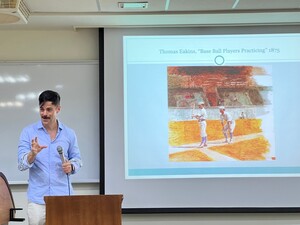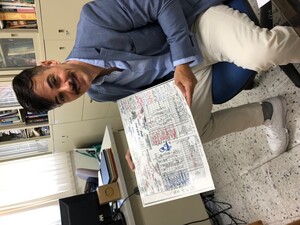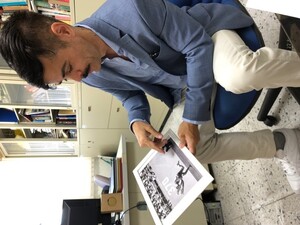As American as Apple Pie: Interviewing Professor Joe Eaton



【Article by Office of International Cooperation】
“If you could travel back in time, which era would you choose to go back to?”
Upon hearing the question, Professor Joe Eaton, who has been teaching American history at NCCU for 15 years, paused for a bit, asked if he could have two answers to that question, then replied without much hesitation, “The American Founding, the 1770s.”
Which shouldn't be a surprise. As a former Research Fellow at the Robert H. Smith International Center for Jefferson Studies, of course Professor Eaton would love to travel back to a time when the unique American experiment eventually culminated in Thomas Jefferson penning the Declaration of Independence.
The late 1960s and 70s is also a time Eaton would love to go back to. Though the 1770s were essential for the founding of America, it was the era symbolized by Don McLean's American Pie, Martin Scorsese's Taxi Driver and the Watergate scandal that could be seen as the birth of modern America.
Eaton wasn't entirely sure if he could picture himself as a hippie chanting ‘Make love, not war,’ but “I'd want to see all the protests, about women, about life, about choices,” he exclaimed, his eyes glinting with excitement.
“And the bra-burning feminists protesting outside the Miss America Pageant?” I prompted.
“Absolutely,” Eaton laughed, agreeing that it'd certainly be interesting to witness how feminisms flourished during that time and how things changed along the way. For example, Billie Jean King, the tennis player who won the ‘Battle of the Sexes’ in 1973, used to represent second-wave feminism whereas now, due to the rise of LGBTQ awareness, she represents the gay community.
Eaton's interest in gender-related issues, which brought on one of his research projects, ‘Ladies’ Day: The Chicago Cubs and Female Fandom, 1919-1969,’ actually sprang from his idyllic childhood as ‘the grandchild of Chicago,’ when he would go to Cubs games at Wrigley Field with his grandfather every summer he spent in Chicago.
“The Chicago Cubs are in my DNA,”
Declared Eaton, who keeps in his office a signed photo of Ferguson Jenkins, the legendary Cubs pitcher inducted into the Hall of Fame in 1991. His prized possessions also include an autographed scorecard from the 2016 World Series Game when the Cubs won their first championship since 1908.
Eaton flipped open a book and showed us the photo of a vintage poster titled ‘Ladies Day,’ featuring Cubs’ free admission to women starting in 1919, the same year women in America won their hard-fought suffrage battle.
“I have aunts and great aunts who would get free tickets on Ladies Day,” Eaton recalled, still slightly amazed. “They were giving away more tickets than some teams were selling, all the way until the 1980s.”
It might have been just a marketing ploy to increase the game's appeal, but the Cubs being the only team offering free tickets to draw in a more diverse crowd definitely made an impression on little Eaton, who later grew up to become an historian and dedicated some of his projects to his childhood memory. A few years ago, Eaton was even invited by the Cubs radio station WSCR to talk about expanding the station's appeal to women listeners because of his historical research.
What made Eaton want to become a historian though?
It turned out that Eaton's grandfather didn't just take him to games and play catch with him. The Chicago grandchild's story time was actually filled with fascinating first-hand accounts from an elder who served in Belgium as a young soldier in WWII as U.S. forces fought their way into the heart of Europe. And Eaton's grandpa didn't just pique little Joey's interest in history: those story hours also turned the inquisitive grandson into a splendid story teller, who could tell history stories as if he had experienced them himself.
As a fast and keen reader, Eaton remembers how his mother would take him to the public library to check out books and how he skipped a lot of the so-called children's literature and dove straight into military history books such as From Casablanca to Berlin, Thirty Seconds Over Tokyo, and A Bridge Too Far.
A Bridge Too Far was later turned into a 3-hour feature film retelling the story of a failed Allied operation in Nazi-occupied territory in WWII. Just like watching the Chicago Cubs was never about winning, Eaton's enthusiasm for military history wasn't about winning or losing either.
“To me, what's interesting is the stuff that might occur off the field, or between plays: the riot, the flag saving,” Eaton commented. He then told us about a project he's been working on—’Lovable Losers: Chicago and the Cubs, 1970-1983.’
Eaton directed our attention to a framed photo on his desk. The dashing figure captured in eternity was that of Cubs outfielder Rick Monday, who, in 1976, saved the American flag from two protesters who were trying to set it on fire at Dodger Stadium. The photo that preserved the mesmerizing moment was later nominated for a Pulitzer Prize and is now on one of Eaton's slides for his course, “American Sports History.”
When Eaton was a kid, becoming a dentist like his father might have crossed his mind, but he never really sought it out. After getting into college as a history major, Eaton went from Military History to Machiavelli, Marx and Mill and was particularly enamored with courses on the French and Russian Revolutions.
“Would that also be a time you'd like to travel back to?” I asked.
“Definitely! It's a little bit more dangerous though, even more than the 1970s,” joked Eaton.
Studying history as an undergraduate and treating oneself to all the greatest hits of Western civilization is one thing; persisting in the academic pursuit is quite another. Two of Eaton's undergraduate tutors at the University of Dallas, Professors Sullivan and Allen, were particularly inspiring.
“They were both young and earnest, with PhDs fresh from Columbia University. Naturally they made me want to follow suit. And their recommendation letters helped,” said Eaton, looking quite grateful.
Eaton's PhD dissertation at Columbia University was about British travelers in America, which in turn got him an invitation to Taiwan for a conference on tourism. After the 10-day stay in Taiwan as a first-timer, Eaton decided that Taiwan was not a bad place for a longer visit and applied to be a Fulbright scholar. Then, at the end of his two years at the Graduate Institute of American Studies in Tamkang University on the Fulbright grant, Eaton accepted an offer from NCCU and began teaching in the Department of History in 2007.
Two of Eaton's English-taught courses—"History of the United States of America” and “American Sports History”— both take a different angle in tackling America, the country that most Taiwanese students grow up memorizing for their exams.
“First-year college students in Taiwan might know about Civil Rights, the Cold War and JFK, but they probably don't know about ‘Baseball, hotdogs, apple pie and Chevrolet”
which is what they're getting from Eaton—an American history class taught with a more personal touch, not to mention more flare, be it Puritan New England, the roaring 1920s, or the swinging 1960s.
Eaton often asks his students questions like, “When did women get the right to vote in your country?” or “What is the national sport of your country?”
A lot of times students are caught on the spot, unable to come up with an answer. But Eaton doesn't really mind, as what's most rewarding about teaching are the various reactions he gets after raising questions as such.
“You say something to a class, it gets refined, and then it's reflected through their experiences and intelligence,” recounts Eaton, who has already become quite used to Taiwanese students’ natural shyness.
“People often ask, what can you do with history?”
Eaton's own answer to that is, “A lot! It opens up new worlds.”
“Americans are obsessed with decline,” Eaton observes. To demonstrate, he reached for his Pixel phone and asked Google to find The Course of Empire, a series of five paintings created by Thomas Cole in the 1830s reflecting the zeitgeist of the era. He looked at Destruction and Desolation in particular and said, “You build an empire, but with an empire comes the seeds of destruction.”
Looking at epic paintings certainly stimulates one's visual imagination of history. How about learning history from movies? I asked.
“A Bridge too Far certainly is a good one for WWII -- I should be watching it again myself, too.” Eaton thought for a bit before suggesting that Arthur Miller's The Crucible is brilliant for understanding the Salem witch trials as well. Eaton described how a friend of his went on to get a PhD on American indigenous people after watching Kevin Costner's directorial debut Dance with Wolves.
“I watched JFK just a while ago when I was in quarantine. The movie was great, but the conspiracy theory is rubbish,” Eaton laughed. Apparently watching history movies with a pinch of salt is highly recommended, especially movies such as Gone with the Wind that glorify the South in the context of slavery.
“I'm actually quite looking forward to the Semiquincentennial!” Eaton had red, white and blue stars in his eyes while talking about 2026, when Americans will be celebrating the 250th anniversary of the Declaration of Independence.
“Maybe 250 is not as big as 200, but I can imagine something, with Fulbright, AIT and the university.” As one of the Board members of Fulbright Taiwan, maybe that's just what Eaton will try to make happen.
With a history professor like Eaton at NCCU, Taiwanese students can get well and truly prepped before they go and see America for themselves.
